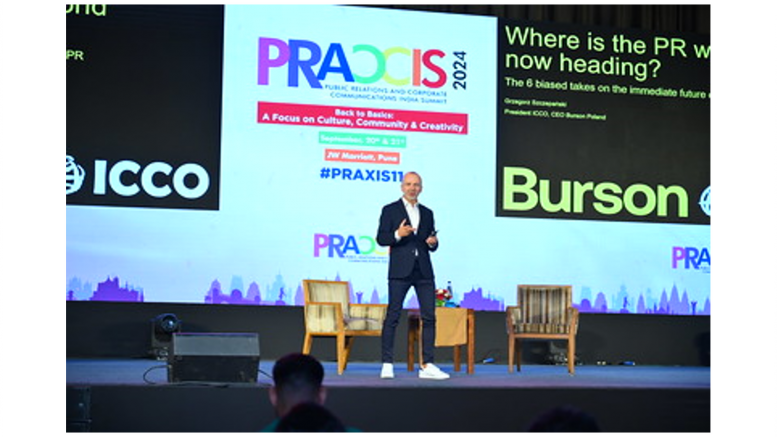At #PRAXIS11, Grzegorz Szczepański, President of the International Communications Consultancy Organisation (ICCO), captivated the audience with his presentation titled “Reputation, Relevance & Relationships: PR’s Impact on Global Issues of Our Time”. A passionate advocate for the Public Relations profession, Szczepański presented his vision of how PR can address the pressing global challenges of today – focusing on six key trends, which he believes will define the future of the industry. We were taken on a journey to analyse PR’s Role in tackling global challenges.
PR & Global Issues: How ICCO is Leading the Fight Against Climate Change and Misinformation!
He began by emphasising Climate Urgency, noting that climate change is one of the most critical issues of our era. Szczepański introduced the innovative “Weather Kids” campaign – a collaborative initiative by The Weather Company and the UN Development Programme. This creative project placed young meteorologists in the spotlight, delivering weather forecasts as if reporting from the future. Their messages were dire, predicting devastating effects of global warming, which would impact 94% of the world’s youth. They also highlighted the broader implications of climate change on food security and the potential trillion-dollar financial burden it could place on global taxpayers.
Szczepański explained that the “Weather Kids” campaign served as a powerful reminder of the role that PR can play in not only raising awareness, but also motivating real action. By tapping into emotional appeal and creativity, PR can effectively convey urgent messages that resonate deeply with the public, inspiring them to take action on critical issues like climate change.
Geopolitics is Everything
Szczepański then shifted the conversation to the broader geopolitical landscape, declaring that “Geopolitics is everything.” He stressed that the global PR industry needs to be aware of the rapidly changing dynamics of geopolitics. He pointed to rising tensions in regions like Ukraine, the Middle East, and Taiwan, which are shaping global narratives. As globalisation, as we know it, begins to unravel, he predicted that PR professionals would need to adapt quickly, embedding competitiveness into their campaigns to navigate these complex political environments.
One of the more troubling trends Szczepański highlighted was the increasing polarisation within societies, particularly in Europe, the US & Canada. He warned that the spread of misinformation and fake news has become a significant challenge for PR professionals. In response, many PR firms are now offering “disinformation shields” – a service designed to protect brands from the reputational damage caused by false or misleading information. Szczepański stressed the importance of ethical communication in this polarised world, urging PR specialists to take a stand as “truth-advocates”. He warned that without ethical boundaries, PR could lose its credibility in the fight against disinformation.
AI: The Big Unknown
Looking ahead, Szczepański discussed the increasing influence of artificial intelligence on the PR industry, dubbing it “AI: The Big Unknown.” He predicted that within a year, we would be analyzing how AI-generated content is being recognised by other AI systems. While AI offers unprecedented opportunities for automation and efficiency, Szczepański warned that it also raises questions about creativity, authenticity, and ethics in public relations. The challenge for PR professionals, he argued, would be to leverage AI without losing the ‘human touch’ that makes storytelling so impactful.
People First: Mental Health in the Spotlight
As the presentation neared its finale, Szczepański focused on the “People First” approach, emphasising the growing importance of mental health in the workplace and in society at large. He shared a startling statistic: suicide is the second leading cause of death among young people globally. This sobering fact, he explained, serves as a wake-up call for PR professionals – to use their influence to address the mental health epidemic that is affecting young people worldwide. He urged the industry to prioritise campaigns that support mental well-being, as human connection and empathy are crucial to creating a positive impact.
ICCO Global Summit 2024: Istanbul Awaits
Szczepański wrapped up his thought-provoking session with an exciting announcement about the upcoming ICCO Global Summit 2024 – set to take place in Istanbul on October 9-10. He stated that this event would provide a platform for PR professionals from around the world to discuss the critical issues shaping the future of the industry, including climate action, disinformation, AI & mental health.
In his final words, he left the audience with a powerful reminder: PR is more than just a tool for reputation management – it is a driving force behind some of the most important social and political changes of our time.
The views and opinions published here belong to the author and do not necessarily reflect the views and opinions of the publisher.






Be the first to comment on "Why PR Must Tackle Climate Urgency & Disinformation Head-On: Grzegorz Szczepański"